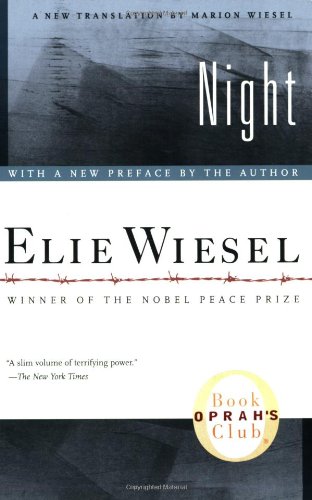All Nonfiction
- Bullying
- Books
- Academic
- Author Interviews
- Celebrity interviews
- College Articles
- College Essays
- Educator of the Year
- Heroes
- Interviews
- Memoir
- Personal Experience
- Sports
- Travel & Culture
All Opinions
- Bullying
- Current Events / Politics
- Discrimination
- Drugs / Alcohol / Smoking
- Entertainment / Celebrities
- Environment
- Love / Relationships
- Movies / Music / TV
- Pop Culture / Trends
- School / College
- Social Issues / Civics
- Spirituality / Religion
- Sports / Hobbies
All Hot Topics
- Bullying
- Community Service
- Environment
- Health
- Letters to the Editor
- Pride & Prejudice
- What Matters
- Back
Summer Guide
- Program Links
- Program Reviews
- Back
College Guide
- College Links
- College Reviews
- College Essays
- College Articles
- Back
Night by Elie Wiesel
When I first started to read Night by Elie Wiesel, I thought it was going to be just like every other Holocaust book out there, the same hatred for Nazis and detailing how terrible the labor was. I was wrong. This book details the true horrors that happened inside the concentration camps and how living in the camps changed Wiesel’s life. I thought I was going to feel the same rage and hatred that I usually do when reading a book about the Holocaust. While reading this book I felt disbelief, sadness, and heartbreak.
Wiesel’s purpose for writing this book was to tell young adults about his story, in hopes that maybe we can comprehend the horrors he went through at such a young age. Wiesel hoped that after us reading his empowering story, that we too can become better people after reading it. Wiesel wanted us to understand that these experiences truly changed his outlook on life and his beliefs. It didn’t just happen in the blink of an eye, it happened gradually over the course of the book.
Wiesel’s story made me really think about my relationship with my own family. Would I be willing to do all the things that Elie did for his father? Would I care for my own family’s health over my own or would I be selfish like some of the other characters in the book? Would I too question my faith in myself and everyone else if I had gone through what he had? Wiesel strongly describes how he was questioning his faith in God and soon became disgusted with the people that He created. Reading how his viewpoints changed so drastically made me question my own faith in God and human beings. If God was so willing to let His people do such horrible things to others, then why should I put all my faith and love into Him? My thoughts about human beings will never return to the way they were after reading this book.
It seems unreal that just one simple book could so drastically change my life, but it is true. My beliefs about God, human beings, and even my own family has changed completely. I no longer believe in human beings as strongly as I used to. Wiesel did such an amazing job trying to put the reader into his situation. I truly felt like I was in the concentration camps with him, making the same decisions he had to. The thought that this book was originally supposed to be about 400 pages longer chills me to the bone. What other terrifying experiences did Wiesel keep from the readers? That is a question that I want the answer to.

